
FRENCH REVIEW
Scope & Guideline
Innovating Interdisciplinary Perspectives in Cultural Analysis
Introduction
Aims and Scopes
- Literary Analysis and Criticism:
The journal focuses on in-depth literary analysis, exploring themes, styles, and historical contexts within French literature, including both classic and contemporary works. - Cultural Studies:
It emphasizes cultural studies, examining the interplay between literature and cultural movements, societal issues, and historical events in French-speaking regions. - Language and Linguistics:
Research on the French language, its evolution, usage, and teaching methodologies is a core area, addressing sociolinguistic aspects and pedagogical approaches. - Interdisciplinary Approaches:
The journal adopts interdisciplinary perspectives, integrating insights from various fields such as history, sociology, and philosophy to enrich the understanding of French literature and culture. - Postcolonial and Diasporic Studies:
There is a significant focus on postcolonial narratives and diasporic identities, addressing the complexities of race, gender, and cultural hybridity in the context of French-speaking communities.
Trending and Emerging
- Intersectionality in Literature:
There is an increasing emphasis on intersectional analyses of literature, exploring how race, gender, class, and sexuality intersect within French texts and contexts. - Digital Humanities and Technology in Language Learning:
The integration of digital tools and methods in language education and literary studies is gaining traction, reflecting the impact of technology on teaching practices and research methodologies. - Ecocriticism and Environmental Studies:
Emerging themes in ecocriticism highlight the relationship between literature and environmental issues, reflecting a growing awareness of ecological concerns in contemporary French literature. - Global Francophone Perspectives:
A trend towards exploring global Francophone literature and its diverse expressions is evident, showcasing the richness of voices from various cultures within the Francophone world. - Critical Engagement with Contemporary Issues:
The journal is increasingly addressing contemporary social issues, such as migration, identity politics, and social justice, reflecting the pressing concerns of today's society.
Declining or Waning
- Traditional Historical Narratives:
There has been a noticeable decline in articles focusing solely on traditional historical narratives, as contemporary scholarship increasingly prioritizes diverse perspectives and marginalized voices. - Conventional Language Instruction Techniques:
The emphasis on conventional language teaching methodologies appears to be waning, with a shift towards more innovative, technology-integrated approaches to language education. - Classical Literary Canon:
The focus on the classical literary canon is diminishing, giving way to a broader exploration of contemporary and globalized literary voices that challenge traditional boundaries. - Static Cultural Representations:
There is a decrease in articles that portray static cultural representations, as the journal increasingly favors dynamic explorations of culture that reflect ongoing changes and complexities. - Monolingual Perspectives:
Research that solely focuses on monolingual perspectives is becoming less common, as there is a growing recognition of the importance of multilingualism and intercultural exchanges in Francophone contexts.
Similar Journals

STUDI FRANCESI
Bridging History and Literature through Critical AnalysisSTUDI FRANCESI, published by Rosenberg & Sellier, is an esteemed journal in the fields of Cultural Studies, History, and Literature and Literary Theory. With an ISSN of 0039-2944, this journal has been a significant contributor to scholarly discourse since its inception in 1967. Operating from Turin, Italy, STUDI FRANCESI aims to explore and critical analyze the interplay between culture, literature, and historical context, reflecting diverse methodologies and perspectives that shape our understanding of the humanities. Despite being classified in Q4 quartiles according to the latest metrics, it offers a unique platform for emerging voices and innovative research, thus serving both seasoned academics and new researchers keen to delve into the nuances of Italian and European cultural heritage. Journals of this caliber are crucial for fostering academic dialogue and expanding the frontiers of knowledge, making it an invaluable resource for students, professionals, and scholars alike.

Anales de Filologia Francesa
Pioneering Research in French Literature and LanguageAnales de Filologia Francesa is a prominent academic journal dedicated to the fields of French philology, linguistics, and literature, published by UNIV MURCIA. Since its transition to open access in 1985, this journal has enabled a wider dissemination of knowledge, fostering scholarly communication among researchers, professionals, and students alike. Based in Spain, Anales de Filologia Francesa plays a pivotal role in addressing current issues and advancements within its scope, underscored by its notable rankings within the Scopus database, where it places in the second and third quartiles across various disciplines related to literature and linguistics. With a commitment to publishing high-quality research, this journal is essential for those looking to engage with cutting-edge studies in French literary theory, language use, and educational practice.
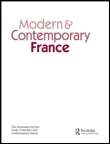
Modern & Contemporary France
Illuminating the Nexus of Culture, History, and PoliticsModern & Contemporary France is a prestigious journal published by Routledge Journals, Taylor & Francis Ltd, focusing on the rich tapestry of French culture, history, and politics from the 20th century to the present day. With an ISSN of 0963-9489 and an E-ISSN of 1469-9869, this influential periodical has established itself as a leading voice in the field, holding a Q2 ranking in both Cultural Studies and History as of 2023. This journal is an invaluable resource for researchers, professionals, and students, providing critical insights and fostering scholarly discussions around contemporary and modern issues concerning France. Its commitment to excellence is further underscored by its notable Scopus rankings, highlighting its significance in the realms of Arts, Humanities, and Social Sciences. Though it operates under a subscription model, the depth and breadth of articles published between 1993 and 2024 make it an essential tool for anyone seeking to understand the complexities of current French society and its historical underpinnings.

Theleme-Revista Complutense de Estudios Franceses
Advancing Knowledge in French Studies Since 1992Theleme-Revista Complutense de Estudios Franceses is a distinguished academic journal published by UNIV COMPLUTENSE MADRID, SERVICIO PUBLICACIONES, dedicated to the exploration of French studies within the fields of linguistics and literature. With an ISSN of 1139-9368 and an E-ISSN of 1989-8193, this journal has proudly maintained its Open Access policy since 1992, ensuring that scholarly research is accessible to a global audience. Based in Spain, the journal is committed to advancing knowledge and fostering discussion in French linguistic and literary theory, as evidenced by its publication history from 2019 to 2024. Despite its current classification in the Q4 quartile for both Linguistics and Literature and Literary Theory as of 2023, Theleme is positioned to grow in its academic influence, reflecting trends in interdisciplinary research. The journal’s rankings in Scopus underscore its unique contributions and the importance of its discourse in the arts and humanities. Researchers, professionals, and students are encouraged to engage with Theleme as a resource for innovative ideas and comprehensive studies that navigate the rich landscape of French language and literature.

Synergies Mexique
Celebrating Mexico's Richness Through Scholarly DialogueSynergies Mexique is a distinguished open-access journal dedicated to exploring contemporary issues and scholarly discussions related to Mexico and its interconnections with global topics. Published by the prestigious Universidad Nacional Autónoma de México in collaboration with GERFLINT, this journal has been making its knowledge freely available since 2011, thereby fostering collaboration and dissemination of research findings among academics, professionals, and students. Although the H-index and precise scope are currently unspecified, the journal is recognized for its commitment to high-quality research and enriching the academic discourse on Mexican society, culture, economy, and politics. By providing a platform for diverse perspectives, Synergies Mexique plays a crucial role in enhancing understanding and appreciation of Mexico in the global context, making it an invaluable resource for researchers and students alike.
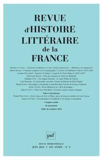
REVUE D HISTOIRE LITTERAIRE DE LA FRANCE
Exploring the Depths of French Literary HeritageREVUE D'HISTOIRE LITTERAIRE DE LA FRANCE, published by Classiques Garnier, is a distinguished academic journal dedicated to the exploration and analysis of French literary history and theory. With an ISSN of 0035-2411 and an E-ISSN of 2105-2689, this journal serves as an essential resource for researchers, professionals, and students in the fields of literature and the humanities. Though it does not currently offer open access, its rigorous scholarship contributes significantly to the understanding of historical literary movements and their cultural contexts. Despite its discontinuation in Scopus after 2016, the journal has a notable academic pedigree, providing critical perspectives on literature from the past to the contemporary era. Situated at 6 Rue de la Sorbonne, Paris 75005, France, the journal aims to enrich the discourse surrounding literary theory and history, highlighting its enduring relevance in today's scholarly landscape.
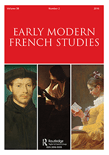
Early Modern French Studies
Exploring the Rich Tapestry of Early Modern French CultureEarly Modern French Studies (ISSN: 2056-3035; E-ISSN: 2056-3043), published by Routledge Journals, Taylor & Francis Ltd, is an essential academic journal that delves into the complexities of early modern French culture, literature, and history. With a focus on interdisciplinary approaches, this journal offers scholars a platform to engage with the evolving dynamics of French studies from 2015 to 2024. Despite its current Q4 ranking in the categories of Cultural Studies, History, and Literature and Literary Theory, Early Modern French Studies seeks to elevate discussions and research that illuminate the richness of the early modern period. While offering traditional subscription options, the journal encourages submissions that challenge prevailing narratives and foster innovative dialogues within the field. This journal is crucial for anyone looking to contribute to or gain insights into the intricate tapestry of early modern French scholarship.

Romanic Review
Celebrating the Richness of Romance Literature and LinguisticsThe Romanic Review, published by Duke University Press, stands as a significant scholarly platform in the field of Romance languages and literature. With its ISSN 0035-8118 and E-ISSN 2688-5220, this journal has been serving the academic community since its inception and will continue its contribution until 2024. Situated in the United States, it has carved out a vital niche in the Arts and Humanities, currently falling within the Q3 quartile as per the 2023 rankings. Although it operates under a traditional subscription model, its focus on disseminating critical and innovative research makes it an indispensable resource for scholars and students alike. The Romanic Review is dedicated to fostering academic discussions that bridge interdisciplinary gaps, making it a cornerstone reference for anyone engaged in the study of Romance cultures, linguistics, and literary studies.
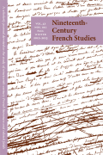
NINETEENTH-CENTURY FRENCH STUDIES
Advancing Scholarship in 19th-Century Literary StudiesNINETEENTH-CENTURY FRENCH STUDIES, published by University of Nebraska Press, is a premier academic journal dedicated to the exploration and analysis of French literature and culture from the 19th century. Established as a vital resource for scholars in the field, this journal is recognized for its contribution to literary studies, holding a commendable Q2 rating in the 2023 category of Literature and Literary Theory, reflecting its academic rigor and relevance. With an ISSN of 0146-7891, it offers a platform for innovative research and scholarly discourse, delving into critical topics that shape our understanding of the era. Although it does not currently operate as an open-access journal, its impactful research is instrumental in guiding literary analysis within the arts and humanities. As it continues its publication journey, converging from 2001 to 2024, NINETEENTH-CENTURY FRENCH STUDIES remains essential for researchers, professionals, and students aiming to gain deeper insights into the complexities of 19th-century French literature.
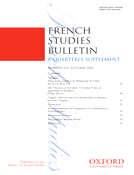
French Studies Bulletin
Exploring the Depths of French Culture and SocietyThe French Studies Bulletin, published by Oxford University Press, serves as a vital resource for scholars and enthusiasts in the fields of Cultural Studies, History, Literature, and Linguistics. With a robust publication history dating from 1981 to 2024, this journal uniquely combines interdisciplinary perspectives while engaging with both contemporary and historical analyses of French culture and society. Although it does not currently offer Open Access options, the journal's rigorous peer-reviewed articles contribute significantly to academic discourse, evident in its 2023 Scopus rankings, where it showcases commendable positions across several categories — particularly Q2 in Literature and Literary Theory. The French Studies Bulletin is essential for researchers striving to deepen their understanding of Francophone contributions and their global impact. Explore the nuances of French studies through comprehensive reviews, scholarly articles, and engaging discussions that inspire critical thought.